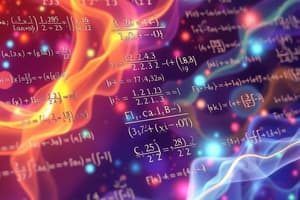Podcast
Questions and Answers
Evaluate the limit: $\lim_{x \to 0} \frac{\sin(5x)}{x}$ and explain your reasoning.
Evaluate the limit: $\lim_{x \to 0} \frac{\sin(5x)}{x}$ and explain your reasoning.
$5$
Find the limit: $\lim_{x \to \infty} \frac{2x^2 + 3x}{x^2 + x}$. What does this limit represent?
Find the limit: $\lim_{x \to \infty} \frac{2x^2 + 3x}{x^2 + x}$. What does this limit represent?
$2$
What is the limit: $\lim_{x \to 1} \frac{\sqrt{x} - 1}{x - 1}$ and how can it be simplified?
What is the limit: $\lim_{x \to 1} \frac{\sqrt{x} - 1}{x - 1}$ and how can it be simplified?
$\frac{1}{2}$
Determine the limit: $\lim_{x \to 1} \frac{x^2 - 1}{x - 1}$ and discuss its significance in terms of continuity.
Determine the limit: $\lim_{x \to 1} \frac{x^2 - 1}{x - 1}$ and discuss its significance in terms of continuity.
Calculate the limit: $\lim_{x \to 0} \frac{e^{2x} - 1}{x}$ and explain the method used.
Calculate the limit: $\lim_{x \to 0} \frac{e^{2x} - 1}{x}$ and explain the method used.
Flashcards are hidden until you start studying
Study Notes
Limit Evaluations
-
Limit of Sine Function
- Evaluate: ( \lim_{x \to 0} \frac{\sin(5x)}{x} )
- Use the fact that ( \lim_{x \to 0} \frac{\sin(kx)}{x} = k ) for constant ( k )
- This limit equates to ( 5 ), indicating that as ( x ) approaches 0, the function behaves linearly with a slope of 5.
-
Limit at Infinity for Rational Functions
- Evaluate: ( \lim_{x \to \infty} \frac{2x^2 + 3x}{x^2 + x} )
- Simplify by dividing each term by ( x^2 ): ( \frac{2 + \frac{3}{x}}{1 + \frac{1}{x}} )
- As ( x ) approaches infinity, the fractions involving ( x ) vanish, yielding a limit of ( 2 ).
- Represents the end behavior of the function as ( x ) becomes very large.
Simplification and Continuity
-
Limit Involving Square Root
- Evaluate: ( \lim_{x \to 1} \frac{\sqrt{x} - 1}{x - 1} )
- Recognize that direct substitution yields an indeterminate form ( \frac{0}{0} ).
- Use the conjugate: multiply numerator and denominator by ( \sqrt{x} + 1 ), leading to ( \lim_{x \to 1} \frac{x - 1}{(x - 1)(\sqrt{x} + 1)} ) which simplifies to ( \frac{1}{\sqrt{1} + 1} = \frac{1}{2} ).
-
Limit of Difference of Squares
- Evaluate: ( \lim_{x \to 1} \frac{x^2 - 1}{x - 1} )
- Factor ( x^2 - 1 ) as ( (x - 1)(x + 1) ), leading to cancellation of ( x - 1 ).
- Simplifies to ( \lim_{x \to 1} (x + 1) = 2 ).
- Signifies continuity of the function at ( x = 1 ), confirming that the limit matches the function value.
Exponential Functions and Their Limits
- Limit of Exponential Function
- Evaluate: ( \lim_{x \to 0} \frac{e^{2x} - 1}{x} )
- Recognize the indeterminate form ( \frac{0}{0} ) and apply L'Hôpital's Rule or use the derivative definition.
- Differentiate the numerator ( e^{2x} ) to obtain ( 2e^{2x} ) and the denominator ( 1 ), resulting in ( 2e^{0} = 2 ).
- This limit represents the rate of change of the function ( e^{2x} ) at ( x = 0 ).
Studying That Suits You
Use AI to generate personalized quizzes and flashcards to suit your learning preferences.




